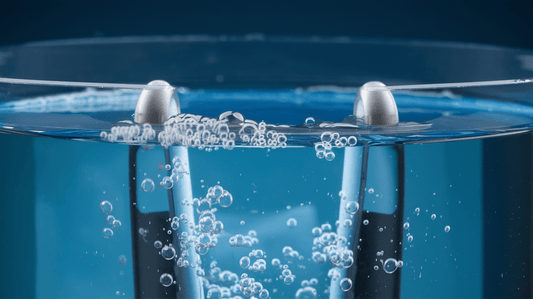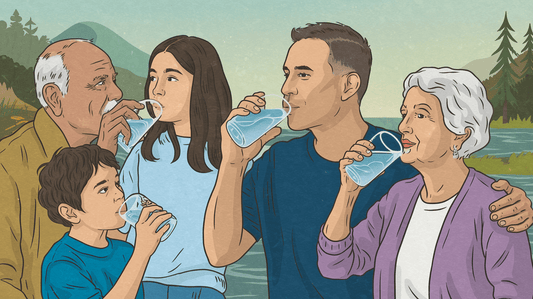The Ultimate Guide to Hydration: Quench Your Thirst for Knowledge
Updated
John Smith
Researcher & Writer
Our Commitment to Accuracy and Objectivity
Ocemida is committed to delivering reliable and unbiased information. Our editorial team, comprised of experienced editors and medical experts, meticulously reviews every article and guide to ensure the content is accurate, up-to-date, and free from bias.
Rigorous Fact-Checking Process
To uphold the highest standards of accuracy, we adhere to the following fact-checking guidelines:
Trusted Sources: We only cite reputable sources, such as peer-reviewed journals, government reports, academic and medical associations, and interviews with credentialed healthcare professionals.
Evidence-Based: All claims and data are supported by at least one credible source. Each article includes a comprehensive bibliography with full citations and links to the original sources.
Internal Linking: While we may include internal links to other relevant Ocemida pages for better navigation, these links are never used as primary sources for scientific information.
Expert Review: A member of our medical or scientific expert team provides a final review of the content and cited sources for all articles and product reviews related to medical and health topics.
By following these rigorous standards, Ocemida strives to provide readers with reliable and informative content.
Share with a friend
Key Takeaways
🟢 Water comprises 60% of the human body and is essential for vital functions like cellular operation, temperature control, joint health, and digestion.
🟢 Rather than following the "8x8" rule, optimal hydration needs vary by individual based on factors like body size, activity level, climate, and health conditions.
🟢 Proper hydration requires maintaining a balance between fluid intake (from drinks and food), fluid output (through sweat and urination), and electrolyte levels.
Are you thirsting for information about proper hydration? Look no further! This comprehensive guide will dive deep into the world of hydration, exploring its importance, benefits, and practical tips to keep your body functioning at its best. Whether you're an athlete, office worker, or simply looking to improve your overall health, understanding hydration is crucial for everyone. Let's embark on this refreshing journey to unlock the secrets of optimal hydration.
Why Hydration Matters: The Foundation of Health
Water is the essence of life, making up about 60% of the human body. Proper hydration is fundamental to our health and well-being, affecting every system in our body. From regulating body temperature to supporting vital organ functions, staying hydrated is crucial for maintaining optimal health.
The Role of Water in Our Bodies
Water plays numerous essential roles in our physiology:
- Cellular function: Water is necessary for cells to perform their tasks efficiently.
- Nutrient transport: It helps carry nutrients and oxygen to cells throughout the body.
- Waste removal: Proper hydration aids in flushing out toxins and waste products.
- Joint lubrication: Water helps cushion and lubricate joints, reducing the risk of injury.
- Temperature regulation: Sweating, which requires water, is our body's natural cooling mechanism.
- Digestion: Adequate hydration is essential for proper digestion and preventing constipation.
Understanding these functions highlights why maintaining proper hydration is so crucial for our overall health and well-being.
The Science of Hydration: More Than Just Drinking Water
Hydration is a complex process that involves various factors beyond simply drinking water. Let's explore the science behind staying hydrated and what it means for our bodies.
Electrolytes and Their Importance
Electrolytes are minerals in our blood and other bodily fluids that carry an electric charge. They play a vital role in hydration by:
- Balancing fluid levels inside and outside of cells
- Regulating nerve and muscle function
- Adjusting blood pH levels
- Helping rebuild damaged tissue
Key electrolytes include:
- Sodium
- Potassium
- Chloride
- Calcium
- Magnesium
Maintaining the proper balance of these electrolytes is crucial for optimal hydration and bodily functions.
The Hydration Equation: Intake vs. Output
Staying hydrated isn't just about how much water you drink; it's about balancing your fluid intake with your fluid output. Factors affecting this balance include:
Fluid Intake Sources
- Water
- Other beverages (tea, coffee, juice, etc.)
- Food (fruits, vegetables, soups, etc.)
Fluid Output Methods
- Urination
- Sweating
- Breathing
- Bowel movements
Understanding this balance is key to maintaining proper hydration levels throughout the day.
Signs of Dehydration: Recognizing When Your Body Needs Water
Dehydration occurs when your body loses more fluids than it takes in. Recognizing the signs of dehydration is crucial for maintaining optimal health and preventing more serious complications.
Common Symptoms of Dehydration
- Thirst: Often the first and most obvious sign
- Dark urine: Urine should be pale yellow; darker colors indicate dehydration
- Dry mouth and lips: Lack of saliva production due to insufficient fluids
- Fatigue: Dehydration can lead to feelings of tiredness and low energy
- Headache: Often caused by reduced blood volume due to fluid loss
- Dizziness: Can occur when blood volume decreases, affecting blood pressure
- Dry skin: Skin may lose its elasticity and feel dry to the touch
- Decreased urine output: Infrequent urination or small amounts of urine
These symptoms are recognized by medical professionals as common indicators of dehydration.
Severe Dehydration Warning Signs
In cases of severe dehydration, more serious symptoms may occur:
- Rapid heartbeat
- Rapid breathing
- Sunken eyes
- Confusion or irritability
- Fainting
If you experience these symptoms, seek medical attention immediately.
Hydration Needs: How Much Should You Drink?
The amount of water each person needs can vary greatly depending on various factors. While the common advice of drinking eight 8-ounce glasses of water per day (known as the 8x8 rule) is a good starting point, individual needs may differ.
Factors Affecting Hydration Needs
- Body size and composition: Larger individuals and those with more muscle mass typically require more water.
- Activity level: More active people need to replace fluids lost through sweat.
- Climate: Hot or humid environments increase fluid loss through sweating.
- Altitude: Higher altitudes can increase fluid loss through respiration and urination.
- Diet: Certain foods (e.g., salty or spicy foods) may increase thirst and hydration needs.
- Health conditions: Some medical conditions or medications may affect hydration requirements.
Calculating Your Personal Hydration Needs
While there's no one-size-fits-all approach, here's a general guideline for calculating your daily water intake:
- Body weight method: Drink 0.5-1 ounce of water per pound of body weight daily.
- Urine color method: Aim for pale yellow urine throughout the day.
- Thirst-driven method: Listen to your body and drink when you feel thirsty.
Remember, these are general guidelines. Consult with a healthcare professional for personalized advice, especially if you have specific health concerns or engage in intense physical activity.
Hydration Strategies: Tips for Staying Properly Hydrated
Maintaining proper hydration throughout the day is essential for optimal health and well-being. Here are some practical strategies to help you stay hydrated:
1. Create a Hydration Schedule
Develop a routine to ensure you're drinking water regularly throughout the day:
- Start your day with a glass of water
- Drink a glass of water with each meal
- Set reminders on your phone or computer to drink water every hour
2. Carry a Reusable Water Bottle
Having water readily available makes it easier to stay hydrated. Choose a bottle that:
- Is the right size for your needs
- Is easy to clean and maintain
- Has measurement markings to track your intake
3. Eat Water-Rich Foods

Incorporate foods with high water content into your diet:
| Food | Water Content |
|---|---|
| Cucumber | 96% |
| Tomatoes | 94% |
| Watermelon | 92% |
| Strawberries | 91% |
| Cantaloupe | 90% |
These foods not only provide hydration but also essential nutrients and fiber.
4. Monitor Caffeine and Alcohol Intake
Both caffeine and alcohol can have diuretic effects, potentially leading to increased fluid loss. While moderate consumption is generally fine, be aware of their impact on hydration:
- Balance caffeinated beverages with additional water intake
- Alternate alcoholic drinks with water or other non-alcoholic beverages
Hydration for Athletes: Fueling Performance
Proper hydration is crucial for athletic performance and recovery. Athletes have unique hydration needs due to increased fluid loss through sweat and respiration during exercise.
Pre-Exercise Hydration
Preparing your body with adequate hydration before exercise is essential:
- Drink 16-20 ounces of water 2-3 hours before exercise
- Consume an additional 8-10 ounces 10-20 minutes before starting
During Exercise Hydration
Maintaining hydration during exercise helps prevent fatigue and maintain performance:
- Drink 7-10 ounces every 10-20 minutes during exercise
- For intense exercise lasting more than an hour, consider sports drinks to replenish electrolytes
Post-Exercise Hydration
Proper rehydration after exercise is crucial for recovery:
- Weigh yourself before and after exercise
- Drink 16-24 ounces of fluid for every pound lost during exercise
- Include electrolytes in your post-workout hydration strategy
Hydration Myths Debunked: Separating Fact from Fiction
There are many misconceptions about hydration that can lead to confusion. Let's address some common myths:
Myth 1: You Need 8 Glasses of Water a Day
Fact: While the 8x8 rule (eight 8-ounce glasses) is a good general guideline, individual needs vary based on factors like activity level, climate, and overall health.
Myth 2: If You're Thirsty, You're Already Dehydrated
Fact: Thirst is actually an early indicator of your body's need for fluids. It's a normal and healthy signal to drink water, not necessarily a sign of significant dehydration.
Myth 3: Coffee and Tea Dehydrate You
Fact: While caffeine has a mild diuretic effect, the fluid in coffee and tea contributes to your daily water intake. Moderate consumption of caffeinated beverages doesn't typically lead to dehydration.
Myth 4: You Can't Drink Too Much Water
Fact: While rare, it is possible to drink too much water, leading to a condition called hyponatremia. This occurs when sodium levels in the blood become diluted, which can be dangerous.
Myth 5: Clear Urine Means You're Well Hydrated
Fact: While pale yellow urine is a sign of good hydration, completely clear urine might indicate overhydration. Aim for a light straw color.
Revolutionize Your Hydration with Ocemida Hydrogen Water
Staying hydrated is now easier than ever with Ocemida's innovative hydrogen water solutions. Our advanced technology infuses pure water with molecular hydrogen, creating a powerful hydration tool for all ages.
Why Ocemida Hydrogen Water?
- Enhanced Hydration: Our hydrogen water optimizes absorption, keeping you effectively hydrated.
- Antioxidant Boost: Hydrogen water provides natural antioxidants to support overall well-being.
- Convenience: Enjoy Ocemida hydrogen water at home or on-the-go with our range of products.
Don't let dehydration hold you back. Ocemida's hydrogen water bottles and alkaline sticks makes it simple to maintain proper hydration levels while nourishing your body with essential minerals.
Elevate your hydration routine with Ocemida's hydrogen water bottle.
Conclusion: Embracing a Hydration-Conscious Lifestyle
Proper hydration is a cornerstone of good health, affecting every system in our bodies. By understanding the science behind hydration, recognizing our individual needs, and implementing effective strategies, we can ensure that we're giving our bodies the fluids they require to function optimally.
Remember, staying hydrated isn't just about drinking water—it's about maintaining a balance of fluids and electrolytes, eating water-rich foods, and being mindful of factors that affect our hydration status. Whether you're an athlete pushing your limits, an office worker aiming to stay focused, or simply someone looking to improve their overall health, proper hydration should be a key part of your daily routine.
As we look to the future, exciting innovations in hydration technology and products promise to make it easier than ever to stay properly hydrated. However, the fundamentals remain the same: listen to your body, drink when you're thirsty, and make hydration a conscious part of your everyday life.
By prioritizing hydration, you're not just quenching your thirst—you're investing in your health, enhancing your performance, and improving your overall quality of life. So raise a glass (of water, of course) to good health and proper hydration!
Table of Contents








































